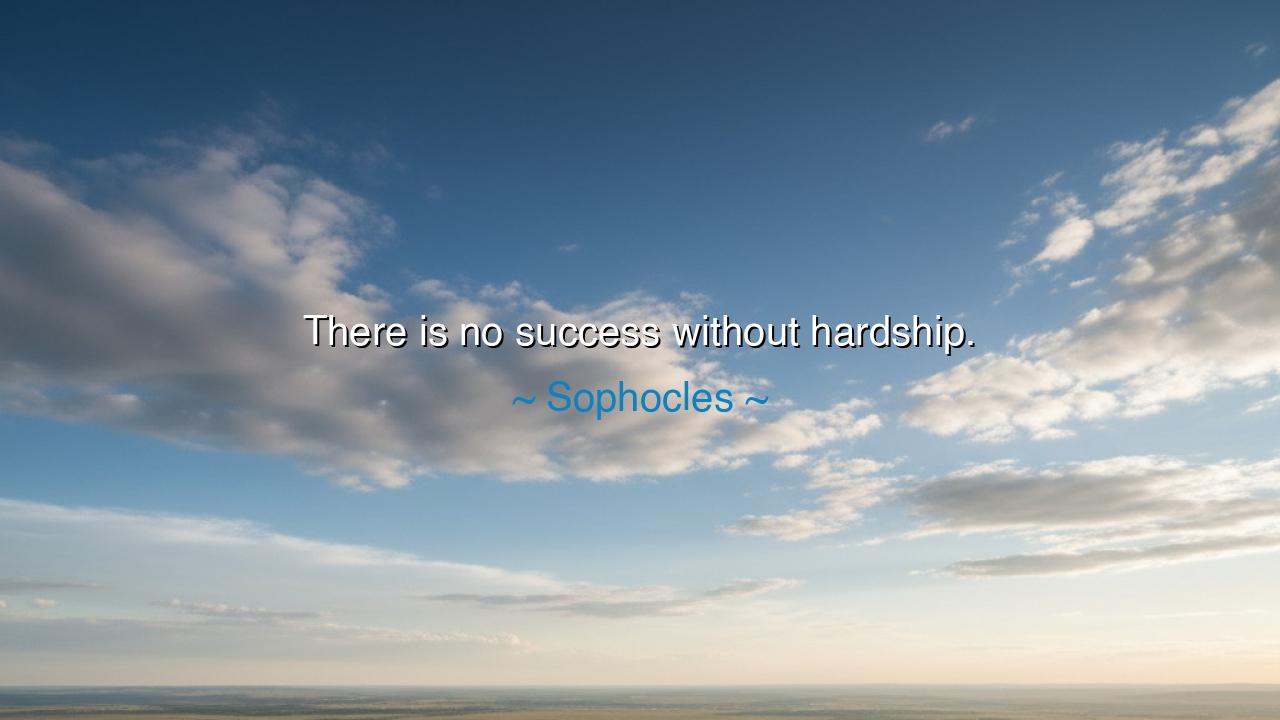
There is no success without hardship.






The words of Sophocles, “There is no success without hardship,” ring like bronze struck upon stone, resonant with the wisdom of ages. In this simple phrase, the ancient dramatist spoke a truth that all men and women must face: that the crown of success is never placed upon the head without first enduring the fire of trial. To triumph without struggle is no triumph at all; to rise without effort is but a hollow ascent. Only when one has passed through darkness can the light be rightly called victory.
The origin of this saying rests in the life and works of Sophocles himself, who lived in Athens during a time of war, plague, and political upheaval. His plays revealed the struggles of heroes and kings, men who suffered greatly before achieving dignity, wisdom, or honor. From Oedipus to Antigone, the path was never smooth—always lined with grief, yet always pointing toward a higher truth. Thus, Sophocles did not speak as a dreamer, but as a witness to the pattern of life: hardship is the forge, and success is the tempered blade it produces.
History testifies again and again to this law. Consider Abraham Lincoln, born into poverty, rising through years of failure, defeat, and ridicule. He lost elections, endured depression, and bore the deaths of those he loved. Yet through these hardships, his spirit was strengthened, until at last he led a fractured nation through its darkest hour. Without his long endurance of suffering, his later success would have been impossible. Truly, hardship was not his enemy but the stern teacher that prepared him for greatness.
The ancients knew this as well. Hercules, the great hero of myth, was not granted his place among the gods through ease or privilege. He was given twelve labors, tasks so great they seemed impossible. By completing them, through sweat, blood, and torment, he proved his worth. His success—immortality and eternal honor—came only because of the hardship he endured. The myth itself is but a reflection of the eternal truth Sophocles expressed.
This wisdom is not meant to dishearten, but to inspire. If you struggle now, know that your hardship is not meaningless. It is the soil in which the roots of your success are growing. The tears you shed, the burdens you bear, the nights you endure in silence—these are not signs of failure, but the very proof that success is being prepared. For no great tree grows without the storm, and no great soul is forged without the hammer of trial.
The lesson, then, is this: do not flee from hardship, but embrace it as a companion on the path to greatness. Train your mind to see in every obstacle the seed of victory. When the world presses you down, remember Sophocles’ words, and let your heart say, “This too is part of my success.” For those who endure hardship without surrender shall rise with a strength that cannot be taken from them.
Practically, this means cultivating patience and resilience. Do not despise small beginnings, nor curse the difficulties that test you. Use them as discipline, as training, as proof of your strength. Keep faith that each step of struggle is shaping your character into one capable of bearing the weight of true success. And when you see others suffering, remind them also that their hardship is not the end, but the preparation for triumph.
Thus, take the wisdom of Sophocles to heart: “There is no success without hardship.” Carry it as a shield when you suffer, as a lamp when you despair, as a sword when you fight. For in the end, success is not given to the lucky, but to the strong, to the enduring, to those who refuse to bow before trial. And when you finally reach your triumph, you will know that it is real, because it was bought with hardship, and sealed with perseverance.






AAdministratorAdministrator
Welcome, honored guests. Please leave a comment, we will respond soon